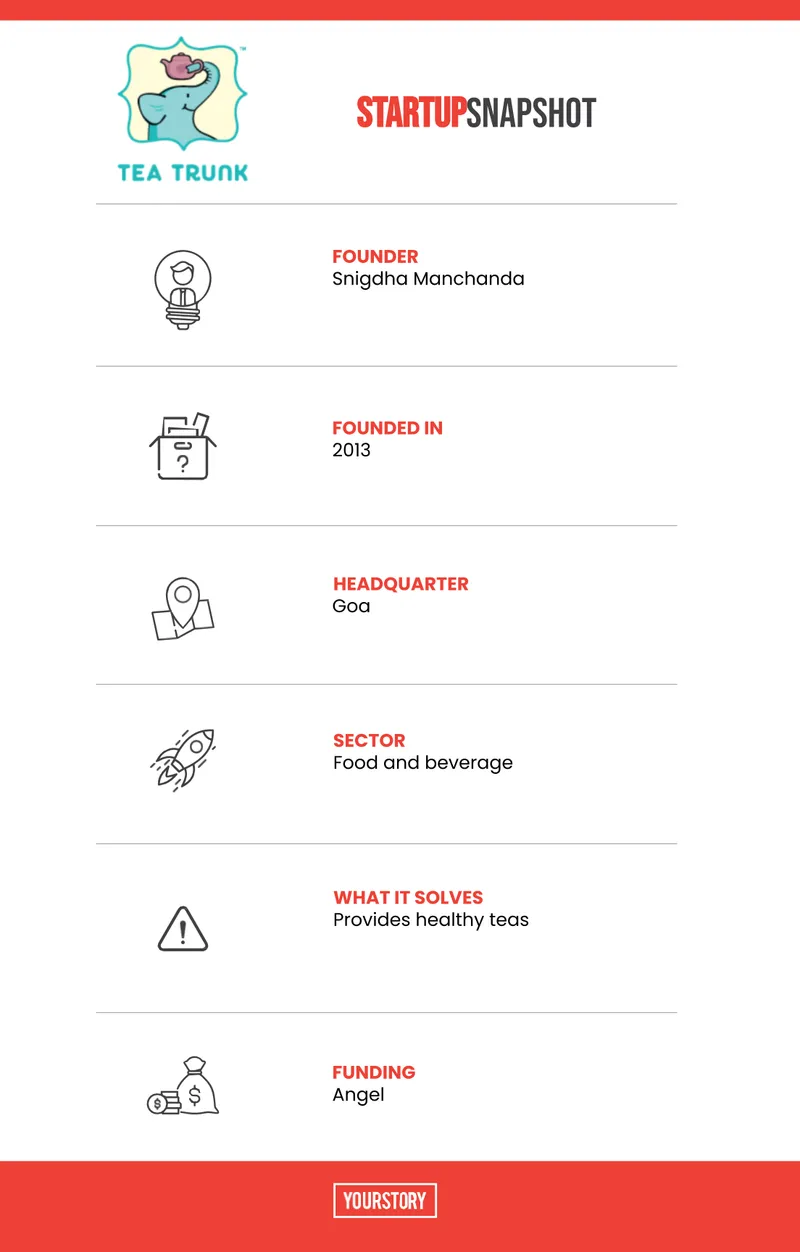[Startup Bharat] How Goa-based Tea Trunk has grown its customer base by nearly 200 pc since inception
Founded in 2013 by an Indian tea sommelier, Goa-based startup Tea Trunk has seen its sales skyrocket and its customer base more than double. The secret behind its success has been something growing companies often neglect -- keeping a finger on the pulse of ever-changing consumer demands.
founder Snigdha Manchanda says the biggest lesson she has had to unlearn in her life was how to build a conventional business.
From building a digital-first tea brand, navigating the world of tea farming, and helping growers understand her vision of the final product, to building out of a state where startups don’t conventionally base themselves, and bootstrapping her way to profitability, her unconventional startup journey has played a big role in seeing Tea Trunk go from strength to strength, especially over the last year.
While other businesses struggled to keep their heads above water when the coronavirus hit the country, for Tea Trunk, the pandemic played out as an important inflexion point.
“We were shipping even when Amazon wasn’t,” she tells YourStory in an interview.
“We did not struggle with inventory or adding more stock even when movement was restricted. We kept selling throughout the pandemic because we were classified as an ‘essential service’, and that really helped us focus on the operational side of things.”
That helped the Goa-based startup’s sales grow 250 percent over the last year — a whopping jump in a key metric that only very few companies could show in the aftermath of multiple lockdowns.

Tea Trunk products
But Tea Trunk had been seeing a slow and steady growth even before the virus hit and changed the consumer buying business, and that was mostly because of the startup’s readiness and receptivity to its community’s asks and changing preferences.
From premium to pop
Snigdha’s love affair with tea began after friends and family who travelled around the world came back with tea as presents. At one point, she says she owned almost a hundred rare and exotic teas.
Despite her extensive collection, Snigdha realised she didn’t know much about the teas she owned. So she set out to Sri Lanka to study teas as a hobby.
When she finally launched Tea Trunk in 2013, the tea sommelier decided to draw from her own experience as a tea drinker to craft gourmet tea blends using only very premium ingredients, which resulted in the products being priced at slightly higher rates than what was available in the market.
The teas were well received by aficionados and casual tea drinkers alike, but the premium price tags excluded a lot of people too.
Snigdha picked up on this, and with some nimble footwork, decided to launch a more affordable range of teas, priced between Rs 350 and Rs 500, lower than Rs 700 to Rs 900 earlier. This served the brand well, especially when the pandemic hit last year.

“We noticed people had become a little price-sensitive during the pandemic, so the new, more affordable line made a lot of sense for them,” she says.
The new range of products has also helped fill the gap left by the shift to working from home, versus offices, where people would often just consume whatever teas and coffees they found in their pantries.
“With work-from-home, people are choosing the beverage they sip on throughout the day, and they’re generally more inclined to pick healthier options such as green teas, or herbal concoctions,” she notes.
And it’s not just the cheaper, more affordable product line that helped sales jump — although their contribution has been significant. The startup has been systematically introducing unique flavours and international teas such as mint matchas, matcha lattes, and even DIY tea blends, which have helped tea drinkers explore a variety of flavours.
To date, the startup has sold over 50 million cups of tea. Its user base has grown 200 percent year-on-year, since its inception.
Focus on health
According to the startup, COVID-19 helped it evaluate and define the kind of brand it wanted to be, going forward.
The launch of over ten boutique tea brands in the last four to five years has marked the end of green tea and tea blends being a novelty item. That, coupled with the pandemic heightening people’s awareness of what they were consuming day in and day out, has led to a consumer shift towards organic, unprocessed, healthy foods.

More consumers today are looking for everyday consumables that come loaded with additional benefits such as immunity boosters.
Tea Trunk had been carrying turmeric green tea since 2017, but the pandemic gave it the opportunity to revive it, as well as other teas, and market them according to the health benefits they provide.
What existed as just a fun-to-drink spearmint tea before is now categorised as a tea that helps people with PMS and indigestion. Similar tea bundles targeting hormonal imbalance, sleep disturbance, and low immunity, among others, are sold on Tea Trunk’s website now.
The startup has also launched a series of products as part of its ‘botanicals’ range, which includes single but beneficial ingredients such as rose petals, lavender buds, lemongrass leaves, nettle leaves, chaga mushrooms, and red clover flowers, among others — all affordably priced.
“When we started out, our focus was on offering our customers an elevated experience. Now, we want to offer teas that have health benefits,” says Snigdha.
“We’re also very focussed on the price point, and are looking to lower our prices to Rs 200, starting, so everyone can access good quality teas,” she adds.
Tea Trunk’s competitors include , TGL Co, Teamonk, Tea Box, and a host of other green tea-specialising companies.

The business
In the fourth quarter of 2020, the startup processed 81,959 orders on its website as well as other ecommerce platforms, up over 10X the number of orders it processed in the first quarter of 2020.
At present, over 60 percent of Tea Trunk’s sales come from its website, directly. The rest is from other online commerce channels such as Amazon, Nykaa, and other platforms.
“When I think of the next product to launch, I always think of how people are using and consuming the tea. The way forward for us is in the healthy tea space, but we also want to make tea drinking a fun experience,” Snigdha says.
To that end, Tea Trunk recently launched a ‘Botanicals Cocktails Kit’ on its website that comes with bartending tools such as a cocktail shaker and a double-sided peg measure. The startup has also collaborated with chocolate company Paul and Mike to create matcha-infused chocolates, as well as launched matcha almond and cashew butters.
In the next few months, the startup is set to unveil its first tea room in Goa, which customers can visit to experience tea the way it is meant to be. Snigdha, who’s passionate about helping others understand tea drinking and better steer aficionados in their own tea journeys, hopes to host workshops and tastings there.

The profitable, bootstrapped startup expects to launch in overseas markets such as the US, Canada, and Singapore soon. Backed by revenue-based financing company Klub, as well as angel investors such as Venkatachalam Muthiah, chairman of Parry Agro; Mandar Vaidya, CEO of OYO Europe; Sorabh Aggarwal; Anand Sinha, ex-global head of Zomato Gold; and Anshul Agarwal, executive director and co-head, of consumer, FIG & business Services at Avendus Capital, the startup is looking at raising a seed round from institutional investors soon.
YourStory’s flagship startup-tech and leadership conference will return virtually for its 13th edition on October 25-30, 2021. Sign up for updates on TechSparks or to express your interest in partnerships and speaker opportunities here.
For more on TechSparks 2021, click here.
Applications are now open for Tech30 2021, a list of 30 most promising tech startups from India. Apply or nominate an early-stage startup to become a Tech30 2021 startup here.
Edited by Megha Reddy


![[Startup Bharat] How Goa-based Tea Trunk has grown its customer base by nearly 200 pc since inception](https://images.yourstory.com/cs/2/11718bd02d6d11e9aa979329348d4c3e/Tea-Trunk1-1630937017852-1-1631018583977.png?mode=crop&crop=faces&ar=2%3A1&format=auto&w=1920&q=75)






